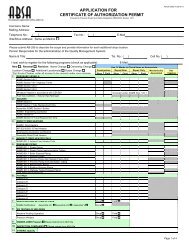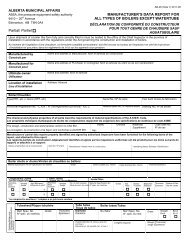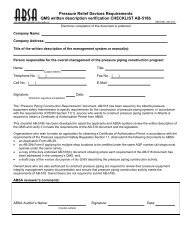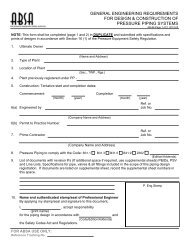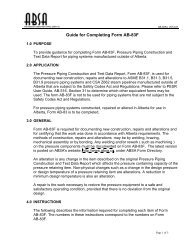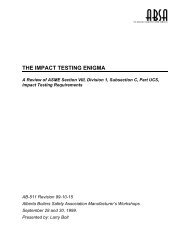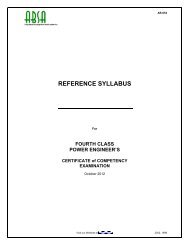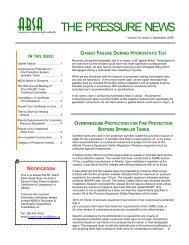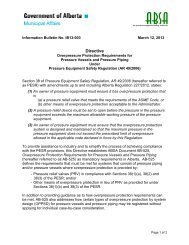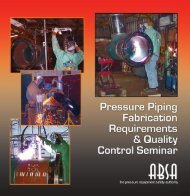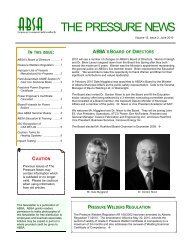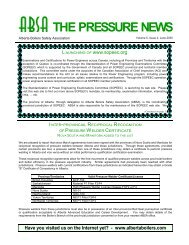The Baker Panel Report - ABSA
The Baker Panel Report - ABSA
The Baker Panel Report - ABSA
Create successful ePaper yourself
Turn your PDF publications into a flip-book with our unique Google optimized e-Paper software.
Fourth, BP did not effectively incorporate process safety considerations into management decision-making that affects the U.S. refineries. BPtended to have a short-term focus, and its decentralized management system and entrepreneurial culture have delegated substantialdiscretion to U.S. refinery plant managers without clearly defining process safety expectations, responsibilities, or accountabilities. In addition,while accountability is a core concept in BP’s Management Framework for driving desired conduct, BP has not demonstrated that it haseffectively held executive management and refining line managers and supervisors, both at the corporate level and at the refinery level,accountable for process safety performance at its U.S. refineries.Finally, BP has not instilled a common, unifying process safety culture among its U.S. refineries. Rather, the <strong>Panel</strong> found that each refinery hasits own separate and distinct process safety culture. While some refineries are far more effective than others in promoting process safety,significant process safety culture issues exist at all five U.S. refineries, not just Texas City. Indeed, the refineries show some similar processsafety cultural weaknesses, even though they do not share a unified process safety culture. <strong>The</strong> <strong>Panel</strong> found instances of a lack of operatingdiscipline, tolerance of serious deviations from safe operating practices, and apparent complacency toward serious process safety risks at eachrefinery.PROCESS SAFETY LEADERSHIPIn a positive process safety culture, all constituencies of the refinery’s workforce—from the plant managers to superintendents to HSSEprofessionals to hourly employees and contractors—regard process safety as a core value, and all levels of the workforce appreciate thatprocess safety expectations are not considered secondary to production goals, budgetary objectives, or other competing considerations. Whilesite leadership is certainly important in establishing a positive process safety culture, the <strong>Panel</strong> believes that leadership from the top of thecompany, starting with the Board and going down, is essential. In the <strong>Panel</strong>’s opinion, it is imperative that BP’s leadership set the processsafety “tone at the top” of the organization and establish appropriate expectations regarding process safety performance. Those expectationsmust reflect an unwavering commitment to process safety and infuse into BP’s workforce the mindset that process accidents are notacceptable. Those expectations must also be translated into measurable goals designed to move BP toward the achievement of excellence inprocess safety performance.Through interviews of the refinery workforce, a review of BP documents, and the process safety culture survey, the <strong>Panel</strong> determined that BP hasnot adequately established process safety as a core value across its U.S. refineries. <strong>The</strong> <strong>Panel</strong> believes that a primary reason that processsafety is not more widely shared as a core value in the U.S. refinery workforce is that BP executive and corporate refining management have notprovided effective process safety leadership. Instead, they provided the refining workforce with a plethora of messages concerning manyvalues, and these tended to dilute the importance of any corporate vision on safety generally, much less process safety in particular. Asdiscussed below, the <strong>Panel</strong> believes that BP has not provided effective leadership on or established appropriate operational expectationsregarding process safety performance at its U.S. refineries. <strong>The</strong> <strong>Panel</strong> also believes that the lack of effective leadership was systemic, touchingall levels of BP’s corporate management having responsibilities relating to BP’s U.S. refineries.BP has emphasized personal safety but not process safety. BP has relied largely upon injury statistics, rather than process safety metrics, inperformance contracts and variable pay programs that it uses to drive conduct within its organization. BP interpreted improving injury rates,which are widely tracked in the industry, as an indication of acceptable process safety performance at its U.S. refineries, BP’s reliance on thisdata and its inadequate process safety understanding created a false sense of confidence that BP was properly addressing process safety risksat these refineries.Corporate Safety Culture C 60



